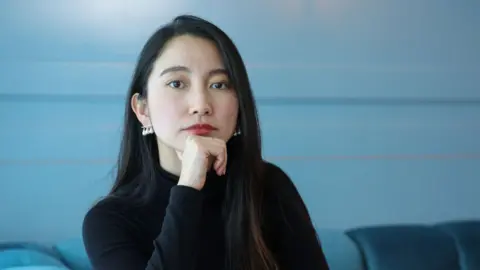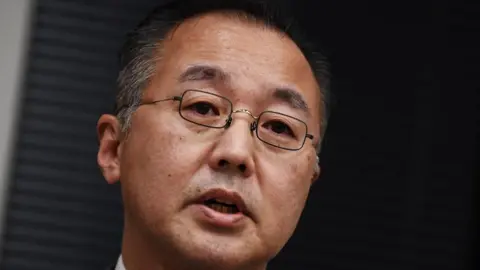Oscar-tipped Japanese MeToo film not shown in Japan
 Getty Images
Getty ImagesWhen Japanese journalist Shiori Ito decided to speak up about her rape allegations, she knew she would do so in the face of a society that prefers silence.
"I'm scared…but all I want to do is to talk about the truth," she says, in the opening scene of her Oscar-nominated documentary Black Box Diaries.
Shiori became the face of Japan's MeToo movement after she accused a prominent journalist, Noriyuki Yamaguchi, of rape. He denies the charges.
Her acclaimed directorial debut, based on her memoir of the same name, is a retelling of her quest for justice, after authorities found insufficient evidence to pursue criminal charges.
But there is one country where the documentary has still not been aired: Japan - where it has run into huge controversy.
Shiori's former lawyers have accused her of including audio and video footage that she did not have permission to use, which, they maintain, has violated trust and put her sources at risk.
She defends what she did as necessary for "public good".
It's a startling turn in a story that gripped Japan when it first broke. Then 28 years old, Shiori had chosen to ignore her family's request to remain silent about the alleged rape. And after her public accusation did not result in a criminal case, she filed a civil lawsuit against Mr Yamaguchi - and won $30,000 (£22,917) in damages.
Shiori told the BBC making the film involved "re-living her trauma".
"It took me four years [to make the film] because, emotionally, I was struggling."
She was an intern at Reuters news agency in 2015, when she claims Mr Yamaguchi invited her to discuss a job opportunity. At the time, he was the Washington bureau chief for a major Japanese media firm, Tokyo Broadcasting System.
Shiori claims she was raped following a dinner in Tokyo with Mr Yamaguchi, who has always denied the allegations.
CCTV footage of an intoxicated Shiori being dragged from a taxi and into a hotel forms part of the more than 400 hours of footage which she has edited for the documentary.
 Getty Images
Getty ImagesShiori, who directed and wrote Black Box Diaries, describes the editing process as "really challenging".
"It was like hardcore exposure therapy," she says.
But when the film was released, the CCTV footage included in the documentary became a source of friction between the director and the team of lawyers who had helped her win her civil case.
The lawyers stated her use of CCTV footage was unauthorised - and that Shiori had violated a pledge not to use it outside of court proceedings. .
Last week, her former lawyers - led by Yoko Nishihiro - held a press conference, in which she said Shiori's use of the footage posed challenges for other sexual assault cases.
"If the fact that the evidence from the trial has been made public is known, we will be unable to obtain cooperation in future cases," Ms Nishihiro said.
Ms Nishihiro claimed Shiori also used unauthorised recordings in the film, which the lawyer only discovered following the screening of the film last July.
The documentary included audio of a police detective who eventually acted as a whistleblower in relation to the investigation process, as well as video of a taxi driver who had provided testimony about the night of the alleged rape.
Both the detective and the taxi driver, the lawyers have argued, were identifiable in the film - and neither had given their consent to be featured.
"I've been trying so hard to protect her for eight-and-half years, and I feel like I've been completely torn apart," Ms Nishihiro said.
"I want her to explain and be held accountable."
Shiori has previously acknowledged that she did not have the hotel's permission to use the CCTV footage, but has argued that it provided "the only visual evidence" of the night she claims she was sexually assaulted.
She said including audio of the police detective was necessary because of "the cover-up of the investigation", and has insisted she was releasing the video "for the public good".
"We are standing in different points of view," she said, referring to her fall-out with her former lawyers.
"For me, [it's for the] public good. For them, it's 'do not break any rules'."
There has been no official explanation as to why the film has not yet been distributed. According to Shiori, "Japan is still not ready to talk about [it]".
However, it remains unclear how far the lack of distribution might also be due to legal hurdles.
In her most recent statement last week, Shiori apologised and said she would re-edit parts of the documentary to make sure individuals could not be identified. She said a redacted version would be screened at a later stage.
"There are moments I wish I didn't have to put in [the documentary]. There are moments I'm not proud of - but I wanted to put all of it, and to show we are also human," she told the BBC.
"No-one is perfect."
In the nine years since the assault, Shiori's fight against Japan's justice system has been well-chronicled in the media - and is something she says she wanted to detail in her documentary.
She was met with a wave of backlash when she went public in 2017, receiving hate mail and online abuse.
"People were telling me you're not crying enough… you're not wearing proper clothes... you're too strong."
Some criticised the way she was dressed at the press conference where she first accused Yamaguchi – they said her shirt had been buttoned too low down. Shiori said she left Japan for a few months, fearing for her safety.
Shiori's case was followed by other high-profile cases. In 2023, former soldier Rina Gonoi also went public with her story, accusing three ex-soldiers of sexually assaulting her. This was the year Japan passed landmark laws to redefine rape from "forcible sexual intercourse" to "non-consensual sexual intercourse" and raised the age of consent from 13 to 16.
Gonoi eventually won her case but Shiori says it is proof that speaking up against sexual violence comes at a price, adding: "Is it worth going through this as a survivor seeking justice? It shouldn't be this way. You have to sacrifice a lot."
For now it's unclear if her film will ever be screened in Japan, but she says that its homecoming would be her ultimate prize.
"This is my love letter to Japan. I really wish one day I can screen my film, and my family can also watch it," she added.
"That's what I really hope for… more than winning an Oscar."
